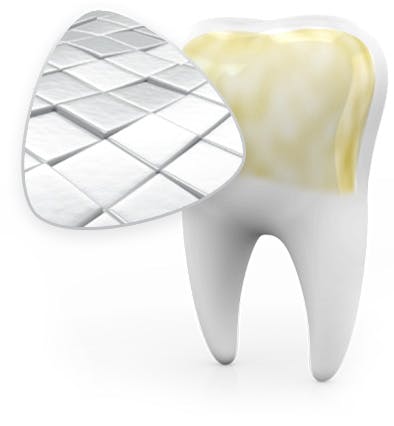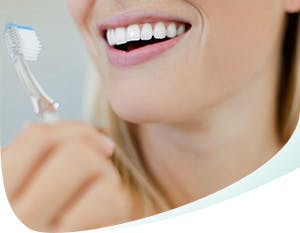What Is Remineralization? How to Remineralize Your Teeth
Enamel protects the inner layers of your teeth from dietary acids.1 Once enamel wears away, it can’t repair itself.1 However, it is possible to repair and strengthen weakened enamel – a process known as ‘remineralization’ – and protect your teeth from future erosion.3 Learn what causes your teeth to lose minerals and how to remineralize your teeth to keep them strong.
Key Takeaways
- Remineralization is the process of restoring lost minerals to your teeth’s enamel, helping to strengthen and protect teeth before permanent damage occurs. It can reverse early signs of acid erosion and prevent further enamel loss.
- A balanced diet rich in calcium, along with healthy saliva production, plays a crucial role in naturally repairing and maintaining strong enamel. Foods like dairy, leafy greens, and fibrous fruits help replenish essential minerals.
- Using fluoride-based products such as Pronamel toothpaste and mouthwash can protect against acid wear and strengthen weakened enamel over time.
What Causes Teeth to Lose Minerals?
Enamel can wear away for a variety of reasons, but one reason for erosion is the acids in your diet.2 These acids attack your tooth enamel, wearing away the minerals that keep it strong – a process called ‘demineralization’.2,3 Over time, this weakens your enamel, and the loss of minerals may soften your teeth and lead to changes in the shape and thickness of the enamel.4 Read our guide to learn more about what causes tooth wear.
Some Symptoms of Enamel Wear
- Pain or sensitivity when consuming hot, cold, or sweet items2
- Yellow discoloration of the teeth2
The good news is, before it’s worn away, acid-weakened enamel can be repaired and those important minerals can be restored. This process is called ‘remineralization’.3
Remineralization, Demineralization and Our Diet


Remineralization occurs when vital mineral ions—like calcium—bond to the teeth to fill in weakened areas of enamel.3

Saliva is one of the most important biological factors for neutralizing the effects of acid exposure on your enamel.3 As it moves around the mouth, it actively helps to clean debris from the teeth while delivering minerals from food you eat and the water you drink directly to your teeth.3

Eating a diet that favors calcium-rich foods can aid in tooth remineralization by helping to replace the missing minerals in your teeth.4
What Are the Best Foods for Remineralizing Teeth?
- Dairy products like milk, cheese and yogurt, leafy greens like kale and broccoli, almonds and other foods that are rich in calcium.4
- Carrots, spinach and sweet potatoes contain vitamin A, which helps with saliva production.4
- Fatty fish, like salmon, contain vitamin D, which helps the body absorb calcium.4
- Consuming probiotics—like those found in certain dairy products—may help displace certain bacteria in the mouth.3 Research is ongoing in this realm.
Find out more about how to actively repair tooth enamel.
5 Tips on How to Remineralize Teeth
With the right oral hygiene and a remineralizing toothpaste and mouthwash, you can strengthen your enamel and help protect against acid erosion.
1. Increase Saliva Production
One of the most effective ways to repair tooth enamel is to maximize the amount of saliva you produce. This is because essential components in your saliva – such as calcium and phosphate – can neutralize harmful acids in your diet and help remineralize your teeth.4 Saliva is also your body’s natural defense against acid erosion.3
Chewing sugar-free gum helps to keep that all-important saliva flow up, protecting your enamel from acid wear and demineralization.4 Always look for gums with the American Dental Association Seal of Acceptance.2,4
2. Drink More Water
Rinsing your mouth with fluoridated tap water after eating or drinking acidic foods and drinks can help prevent tooth decay and promote remineralization, because water helps to neutralize the acids and help deliver the minerals in your saliva back to your enamel.3,4
3. Use a Remineralizing Toothpaste and Mouthwash
Opt for a toothpaste clinically proven to help rebuild enamel strength, like Pronamel. Pronamel has a line of specially designed remineralizing toothpastes that penetrate deep into the enamel surface and strengthen acid-weakened enamel to help protect your teeth every time you brush. Pair your remineralizing toothpaste with Pronamel’s Intensive Enamel Repair Mouthwash forenhanced enamel protection. Learn how Pronamel toothpaste actively strengthens weakened tooth enamel.
4. Eat a Remineralization Diet
Certain foods can help remineralize softened areas in your teeth that acidic foods and drinks have weakened. For example, foods rich in calcium (dairy products like milk, cheese and yogurt) help put back minerals into the enamel, and fiber-rich fruits and vegetables encourage saliva flow.4
5. Dodge Acidic Drinks
Drinks that contribute to tooth demineralization include sodas, sports drinks and fruit juices. In addition to their sugar content, these are all highly acidic and can wear down enamel – a combination that puts you at greater risk of demineralization and tooth decay.2
Take Steps to Remineralize Teeth
You can help remineralize your teeth by following the tips above and adopting a good dental hygiene routine. You should also pay regular visits to your dentist to spot early signs of demineralization.
Follow a Daily Remineralizing Routine
- Brush your teeth twice daily with a fluoride-based, remineralizing toothpaste like Pronamel4
- Rinse with a fluoride mouthwash2
- Drink water throughout the day4
- Avoid snacking between meals4
- Chew sugar-free gum or eat high-fiber foods to stimulate saliva production2
Backed by 17 years of research and clinical studies, Promanel Clinical Enamel Strength Deep Clean toothpaste helps keep enamel in its prime* and starts to strength enamel from the first brush.^ Rinsing with Pronamel Intensive Enamel Repair Mouthwash actively repairs acid-weakened enamel beyond brushing alone.**
Find out where to buy Pronamel and start your journey to healthier, stronger teeth.
Frequently Asked Questions
Can you rebuild tooth enamel naturally?
No. Once enamel wears away, it can’t rebuild or repair itself naturally.1 However, early-stage damage can be reversed through remineralization.3
What are the signs of enamel erosion?
Common signs include increased tooth sensitivity and tooth discoloration.2
Is fluoride necessary for tooth remineralization?
Yes. Fluoride is encouraged and the most effective method for preventing cavities is through topical fluoride, like toothpaste.3
*with an appropriate diet and 2x daily brushing
^with twice daily brushing
**when used as directed with a fluoride toothpaste
Source Citations:
- Tooth. Mouth Healthy. https://www.mouthhealthy.org/en/az-topics/t/tooth. Accessed on 30/03/20.
- Dietary acids and your teeth. Mouth Healthy. https://www.mouthhealthy.org/en/az-topics/e/dietary-acids-and-your-teeth. Accessed on 22/01/20.
- Demineralization–remineralization dynamics in teeth and bone. International Journal of Nanomedicine (2016). https://www.ncbi.nlm.nih.gov/pmc/articles/PMC5034904/pdf/ijn-11-4743.pdf. Accessed 30/03/20.
- The Best and Worst Foods for Your teeth. University of Rochester Medical School. https://www.urmc.rochester.edu/encyclopedia/content.aspx?ContentTypeID=1&ContentID=4062. Accessed 22/01/20.
- 5. Your Guide to Vitamins for Strong Teeth. Penn School of Dental Medicine. https://penndentalmedicine.org/blog/vitamins-for-teeth/. Accessed 5/1/25.




